Sociology: Effects of Child Sexual and Emotional Abuse on Children
VerifiedAdded on 2023/01/23
|31
|9380
|50
Essay
AI Summary
This essay delves into the profound and lasting effects of child sexual and emotional abuse on children's mental and physical health. It examines the concepts of sexual abuse, its various forms, and the psychological impacts, including fear, guilt, isolation, anger, and betrayal. The study investigates the probable short-term and long-term outcomes, such as difficulties in interpersonal relationships and potential mental health disorders like depression and PTSD. The essay highlights the negative effects on mental health, drawing upon UK-based studies that reveal the link between abuse and suicidal tendencies, as well as the impact on parent-child attachments and the potential for psychiatric disorders. The study underscores the importance of timely interventions and support systems for children who have experienced abuse.
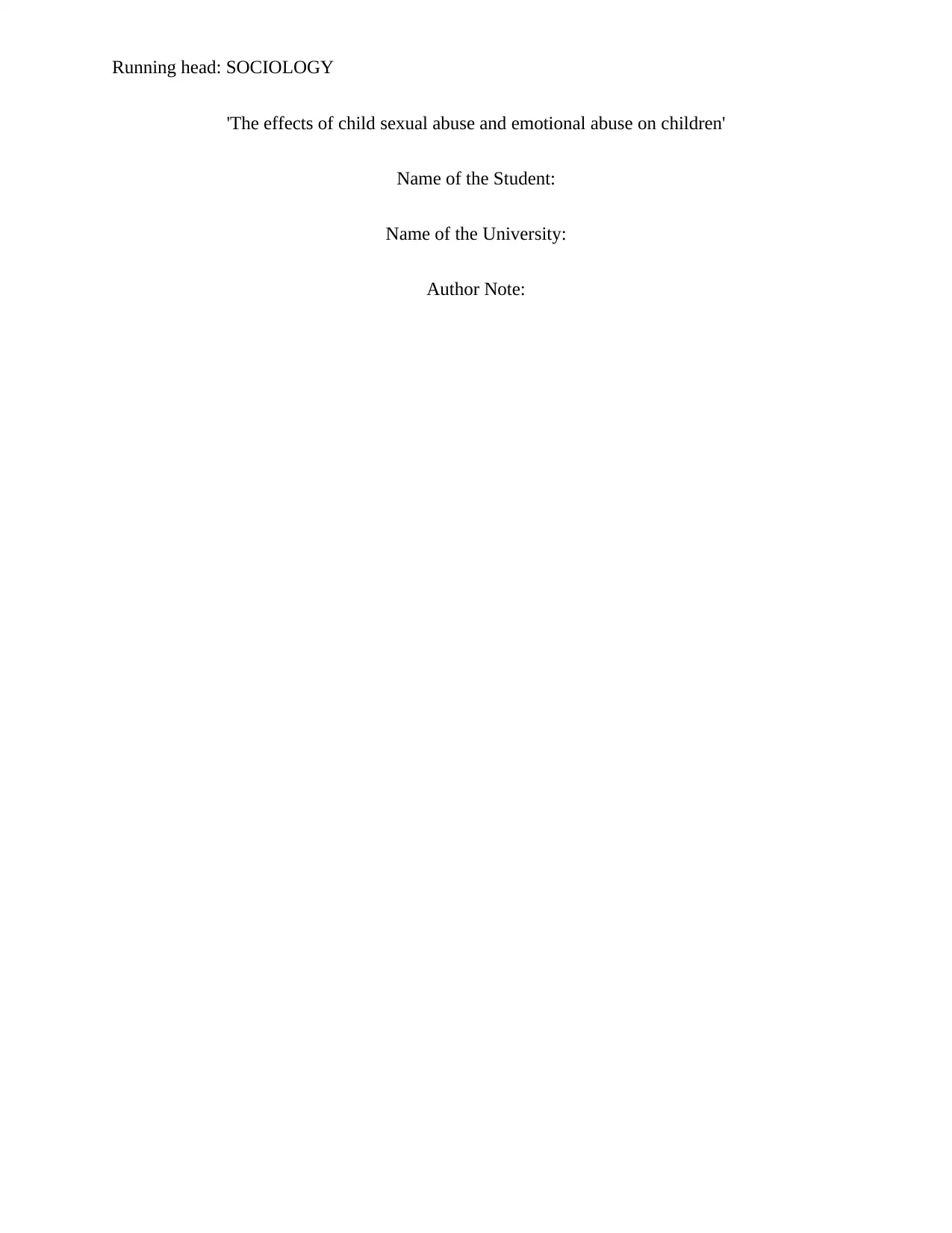
Running head: SOCIOLOGY
'The effects of child sexual abuse and emotional abuse on children'
Name of the Student:
Name of the University:
Author Note:
'The effects of child sexual abuse and emotional abuse on children'
Name of the Student:
Name of the University:
Author Note:
Paraphrase This Document
Need a fresh take? Get an instant paraphrase of this document with our AI Paraphraser
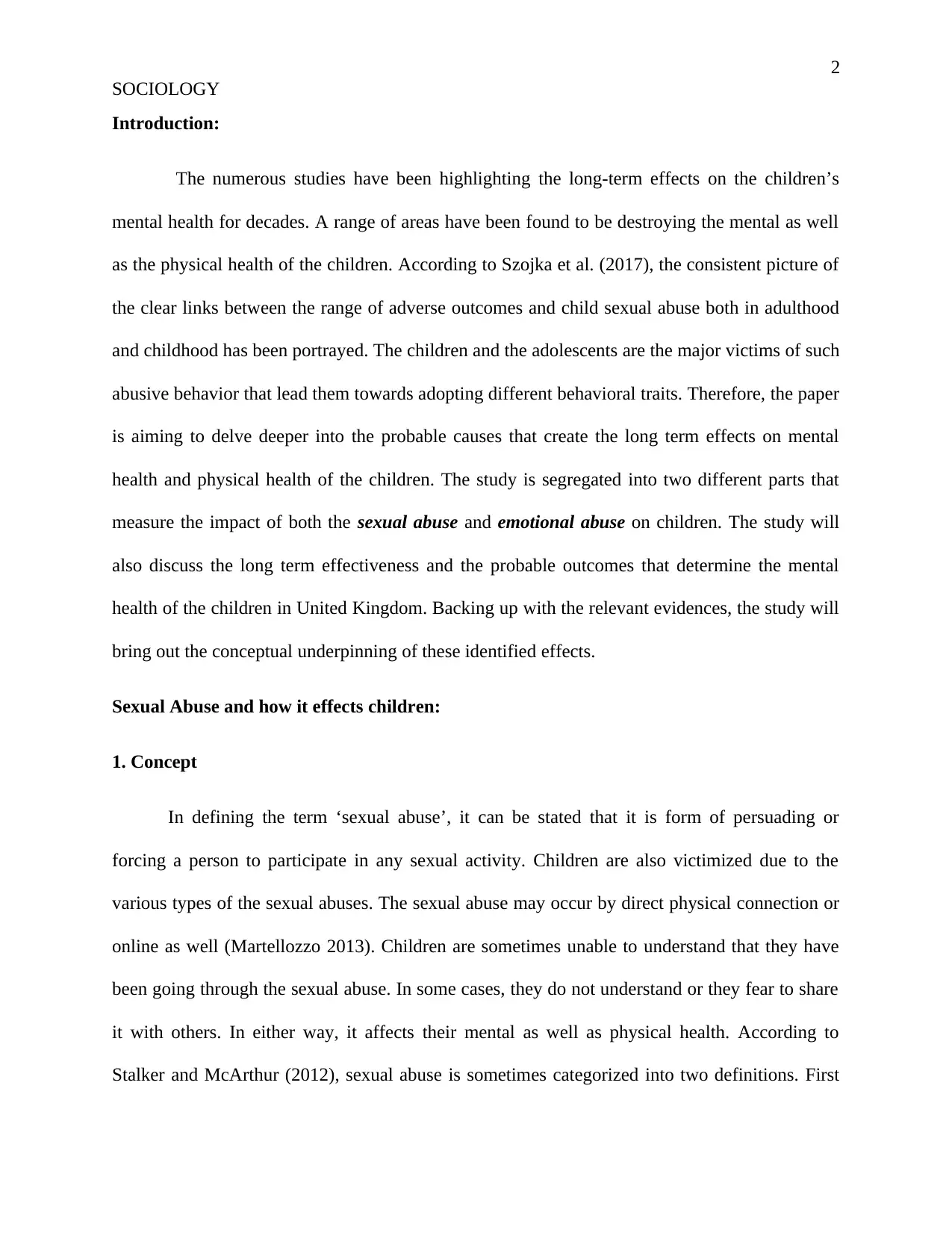
2
SOCIOLOGY
Introduction:
The numerous studies have been highlighting the long-term effects on the children’s
mental health for decades. A range of areas have been found to be destroying the mental as well
as the physical health of the children. According to Szojka et al. (2017), the consistent picture of
the clear links between the range of adverse outcomes and child sexual abuse both in adulthood
and childhood has been portrayed. The children and the adolescents are the major victims of such
abusive behavior that lead them towards adopting different behavioral traits. Therefore, the paper
is aiming to delve deeper into the probable causes that create the long term effects on mental
health and physical health of the children. The study is segregated into two different parts that
measure the impact of both the sexual abuse and emotional abuse on children. The study will
also discuss the long term effectiveness and the probable outcomes that determine the mental
health of the children in United Kingdom. Backing up with the relevant evidences, the study will
bring out the conceptual underpinning of these identified effects.
Sexual Abuse and how it effects children:
1. Concept
In defining the term ‘sexual abuse’, it can be stated that it is form of persuading or
forcing a person to participate in any sexual activity. Children are also victimized due to the
various types of the sexual abuses. The sexual abuse may occur by direct physical connection or
online as well (Martellozzo 2013). Children are sometimes unable to understand that they have
been going through the sexual abuse. In some cases, they do not understand or they fear to share
it with others. In either way, it affects their mental as well as physical health. According to
Stalker and McArthur (2012), sexual abuse is sometimes categorized into two definitions. First
SOCIOLOGY
Introduction:
The numerous studies have been highlighting the long-term effects on the children’s
mental health for decades. A range of areas have been found to be destroying the mental as well
as the physical health of the children. According to Szojka et al. (2017), the consistent picture of
the clear links between the range of adverse outcomes and child sexual abuse both in adulthood
and childhood has been portrayed. The children and the adolescents are the major victims of such
abusive behavior that lead them towards adopting different behavioral traits. Therefore, the paper
is aiming to delve deeper into the probable causes that create the long term effects on mental
health and physical health of the children. The study is segregated into two different parts that
measure the impact of both the sexual abuse and emotional abuse on children. The study will
also discuss the long term effectiveness and the probable outcomes that determine the mental
health of the children in United Kingdom. Backing up with the relevant evidences, the study will
bring out the conceptual underpinning of these identified effects.
Sexual Abuse and how it effects children:
1. Concept
In defining the term ‘sexual abuse’, it can be stated that it is form of persuading or
forcing a person to participate in any sexual activity. Children are also victimized due to the
various types of the sexual abuses. The sexual abuse may occur by direct physical connection or
online as well (Martellozzo 2013). Children are sometimes unable to understand that they have
been going through the sexual abuse. In some cases, they do not understand or they fear to share
it with others. In either way, it affects their mental as well as physical health. According to
Stalker and McArthur (2012), sexual abuse is sometimes categorized into two definitions. First
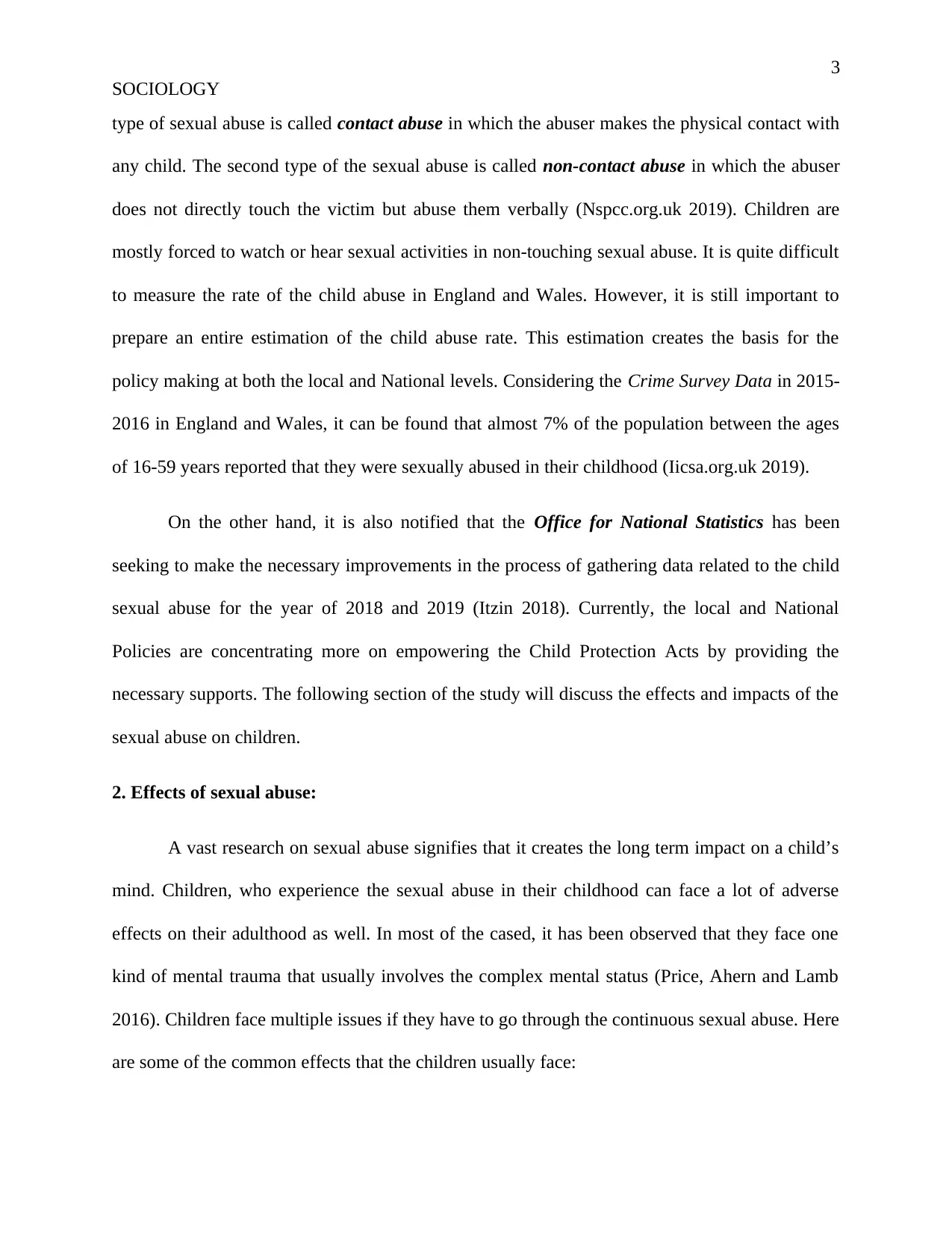
3
SOCIOLOGY
type of sexual abuse is called contact abuse in which the abuser makes the physical contact with
any child. The second type of the sexual abuse is called non-contact abuse in which the abuser
does not directly touch the victim but abuse them verbally (Nspcc.org.uk 2019). Children are
mostly forced to watch or hear sexual activities in non-touching sexual abuse. It is quite difficult
to measure the rate of the child abuse in England and Wales. However, it is still important to
prepare an entire estimation of the child abuse rate. This estimation creates the basis for the
policy making at both the local and National levels. Considering the Crime Survey Data in 2015-
2016 in England and Wales, it can be found that almost 7% of the population between the ages
of 16-59 years reported that they were sexually abused in their childhood (Iicsa.org.uk 2019).
On the other hand, it is also notified that the Office for National Statistics has been
seeking to make the necessary improvements in the process of gathering data related to the child
sexual abuse for the year of 2018 and 2019 (Itzin 2018). Currently, the local and National
Policies are concentrating more on empowering the Child Protection Acts by providing the
necessary supports. The following section of the study will discuss the effects and impacts of the
sexual abuse on children.
2. Effects of sexual abuse:
A vast research on sexual abuse signifies that it creates the long term impact on a child’s
mind. Children, who experience the sexual abuse in their childhood can face a lot of adverse
effects on their adulthood as well. In most of the cased, it has been observed that they face one
kind of mental trauma that usually involves the complex mental status (Price, Ahern and Lamb
2016). Children face multiple issues if they have to go through the continuous sexual abuse. Here
are some of the common effects that the children usually face:
SOCIOLOGY
type of sexual abuse is called contact abuse in which the abuser makes the physical contact with
any child. The second type of the sexual abuse is called non-contact abuse in which the abuser
does not directly touch the victim but abuse them verbally (Nspcc.org.uk 2019). Children are
mostly forced to watch or hear sexual activities in non-touching sexual abuse. It is quite difficult
to measure the rate of the child abuse in England and Wales. However, it is still important to
prepare an entire estimation of the child abuse rate. This estimation creates the basis for the
policy making at both the local and National levels. Considering the Crime Survey Data in 2015-
2016 in England and Wales, it can be found that almost 7% of the population between the ages
of 16-59 years reported that they were sexually abused in their childhood (Iicsa.org.uk 2019).
On the other hand, it is also notified that the Office for National Statistics has been
seeking to make the necessary improvements in the process of gathering data related to the child
sexual abuse for the year of 2018 and 2019 (Itzin 2018). Currently, the local and National
Policies are concentrating more on empowering the Child Protection Acts by providing the
necessary supports. The following section of the study will discuss the effects and impacts of the
sexual abuse on children.
2. Effects of sexual abuse:
A vast research on sexual abuse signifies that it creates the long term impact on a child’s
mind. Children, who experience the sexual abuse in their childhood can face a lot of adverse
effects on their adulthood as well. In most of the cased, it has been observed that they face one
kind of mental trauma that usually involves the complex mental status (Price, Ahern and Lamb
2016). Children face multiple issues if they have to go through the continuous sexual abuse. Here
are some of the common effects that the children usually face:
⊘ This is a preview!⊘
Do you want full access?
Subscribe today to unlock all pages.

Trusted by 1+ million students worldwide
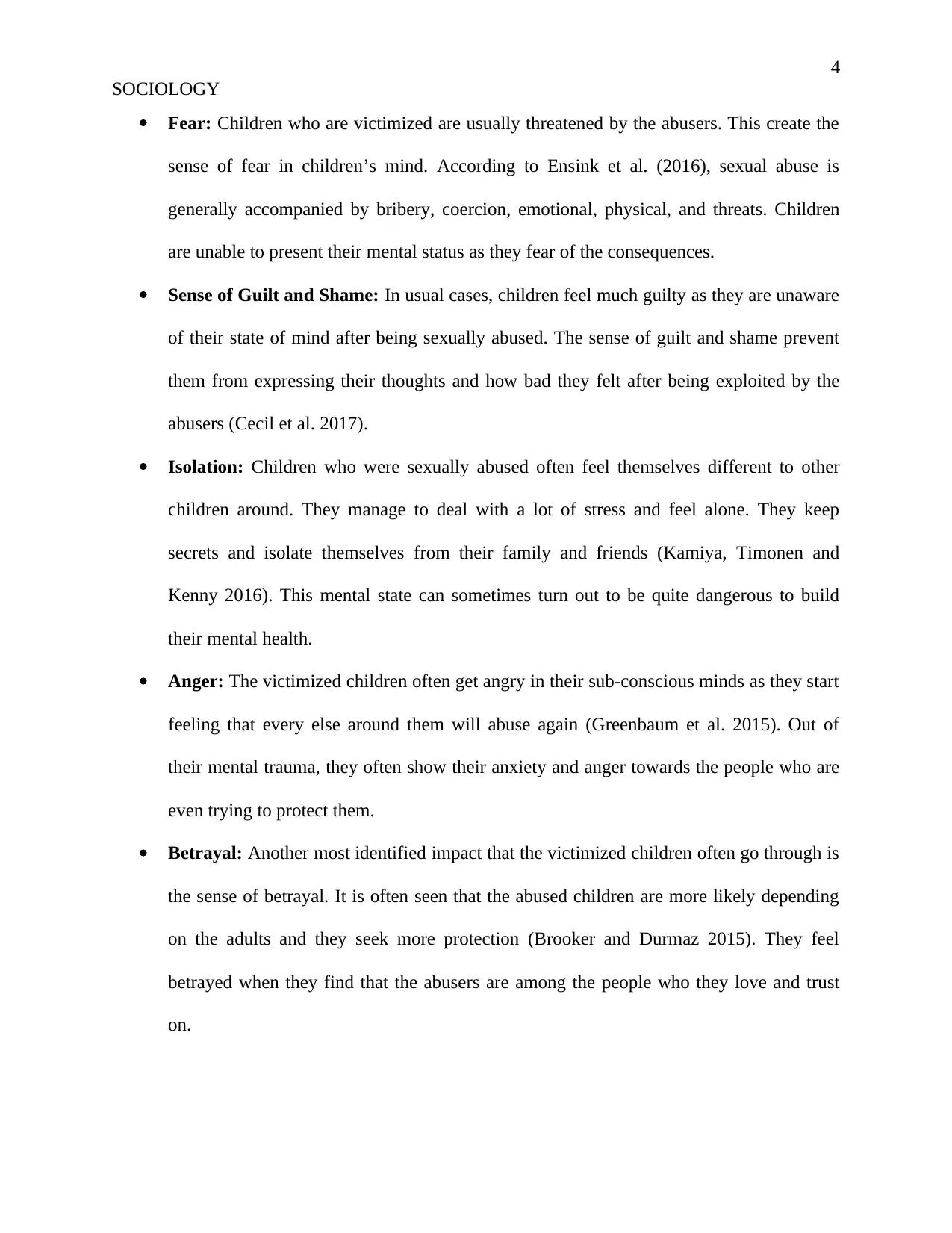
4
SOCIOLOGY
Fear: Children who are victimized are usually threatened by the abusers. This create the
sense of fear in children’s mind. According to Ensink et al. (2016), sexual abuse is
generally accompanied by bribery, coercion, emotional, physical, and threats. Children
are unable to present their mental status as they fear of the consequences.
Sense of Guilt and Shame: In usual cases, children feel much guilty as they are unaware
of their state of mind after being sexually abused. The sense of guilt and shame prevent
them from expressing their thoughts and how bad they felt after being exploited by the
abusers (Cecil et al. 2017).
Isolation: Children who were sexually abused often feel themselves different to other
children around. They manage to deal with a lot of stress and feel alone. They keep
secrets and isolate themselves from their family and friends (Kamiya, Timonen and
Kenny 2016). This mental state can sometimes turn out to be quite dangerous to build
their mental health.
Anger: The victimized children often get angry in their sub-conscious minds as they start
feeling that every else around them will abuse again (Greenbaum et al. 2015). Out of
their mental trauma, they often show their anxiety and anger towards the people who are
even trying to protect them.
Betrayal: Another most identified impact that the victimized children often go through is
the sense of betrayal. It is often seen that the abused children are more likely depending
on the adults and they seek more protection (Brooker and Durmaz 2015). They feel
betrayed when they find that the abusers are among the people who they love and trust
on.
SOCIOLOGY
Fear: Children who are victimized are usually threatened by the abusers. This create the
sense of fear in children’s mind. According to Ensink et al. (2016), sexual abuse is
generally accompanied by bribery, coercion, emotional, physical, and threats. Children
are unable to present their mental status as they fear of the consequences.
Sense of Guilt and Shame: In usual cases, children feel much guilty as they are unaware
of their state of mind after being sexually abused. The sense of guilt and shame prevent
them from expressing their thoughts and how bad they felt after being exploited by the
abusers (Cecil et al. 2017).
Isolation: Children who were sexually abused often feel themselves different to other
children around. They manage to deal with a lot of stress and feel alone. They keep
secrets and isolate themselves from their family and friends (Kamiya, Timonen and
Kenny 2016). This mental state can sometimes turn out to be quite dangerous to build
their mental health.
Anger: The victimized children often get angry in their sub-conscious minds as they start
feeling that every else around them will abuse again (Greenbaum et al. 2015). Out of
their mental trauma, they often show their anxiety and anger towards the people who are
even trying to protect them.
Betrayal: Another most identified impact that the victimized children often go through is
the sense of betrayal. It is often seen that the abused children are more likely depending
on the adults and they seek more protection (Brooker and Durmaz 2015). They feel
betrayed when they find that the abusers are among the people who they love and trust
on.
Paraphrase This Document
Need a fresh take? Get an instant paraphrase of this document with our AI Paraphraser
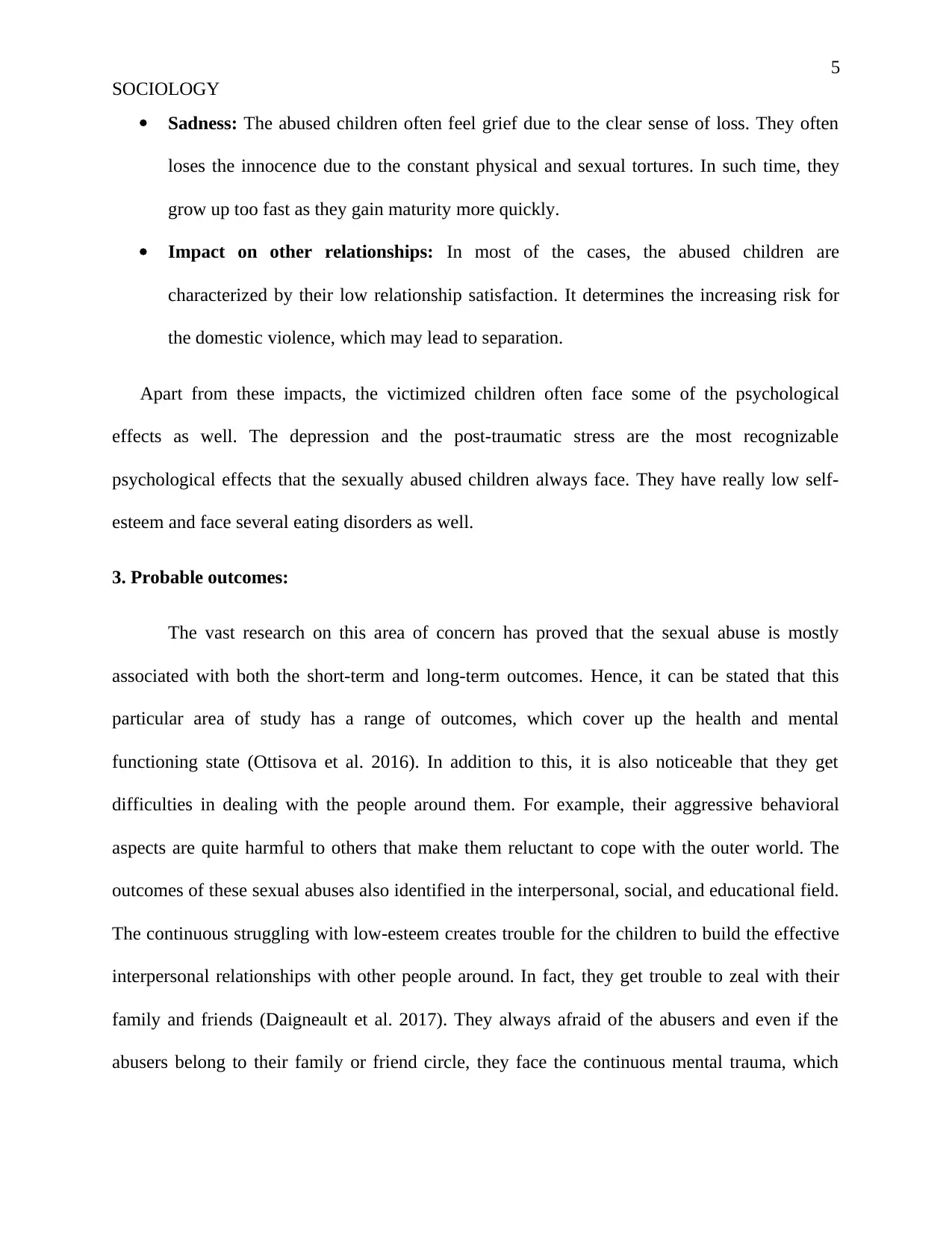
5
SOCIOLOGY
Sadness: The abused children often feel grief due to the clear sense of loss. They often
loses the innocence due to the constant physical and sexual tortures. In such time, they
grow up too fast as they gain maturity more quickly.
Impact on other relationships: In most of the cases, the abused children are
characterized by their low relationship satisfaction. It determines the increasing risk for
the domestic violence, which may lead to separation.
Apart from these impacts, the victimized children often face some of the psychological
effects as well. The depression and the post-traumatic stress are the most recognizable
psychological effects that the sexually abused children always face. They have really low self-
esteem and face several eating disorders as well.
3. Probable outcomes:
The vast research on this area of concern has proved that the sexual abuse is mostly
associated with both the short-term and long-term outcomes. Hence, it can be stated that this
particular area of study has a range of outcomes, which cover up the health and mental
functioning state (Ottisova et al. 2016). In addition to this, it is also noticeable that they get
difficulties in dealing with the people around them. For example, their aggressive behavioral
aspects are quite harmful to others that make them reluctant to cope with the outer world. The
outcomes of these sexual abuses also identified in the interpersonal, social, and educational field.
The continuous struggling with low-esteem creates trouble for the children to build the effective
interpersonal relationships with other people around. In fact, they get trouble to zeal with their
family and friends (Daigneault et al. 2017). They always afraid of the abusers and even if the
abusers belong to their family or friend circle, they face the continuous mental trauma, which
SOCIOLOGY
Sadness: The abused children often feel grief due to the clear sense of loss. They often
loses the innocence due to the constant physical and sexual tortures. In such time, they
grow up too fast as they gain maturity more quickly.
Impact on other relationships: In most of the cases, the abused children are
characterized by their low relationship satisfaction. It determines the increasing risk for
the domestic violence, which may lead to separation.
Apart from these impacts, the victimized children often face some of the psychological
effects as well. The depression and the post-traumatic stress are the most recognizable
psychological effects that the sexually abused children always face. They have really low self-
esteem and face several eating disorders as well.
3. Probable outcomes:
The vast research on this area of concern has proved that the sexual abuse is mostly
associated with both the short-term and long-term outcomes. Hence, it can be stated that this
particular area of study has a range of outcomes, which cover up the health and mental
functioning state (Ottisova et al. 2016). In addition to this, it is also noticeable that they get
difficulties in dealing with the people around them. For example, their aggressive behavioral
aspects are quite harmful to others that make them reluctant to cope with the outer world. The
outcomes of these sexual abuses also identified in the interpersonal, social, and educational field.
The continuous struggling with low-esteem creates trouble for the children to build the effective
interpersonal relationships with other people around. In fact, they get trouble to zeal with their
family and friends (Daigneault et al. 2017). They always afraid of the abusers and even if the
abusers belong to their family or friend circle, they face the continuous mental trauma, which
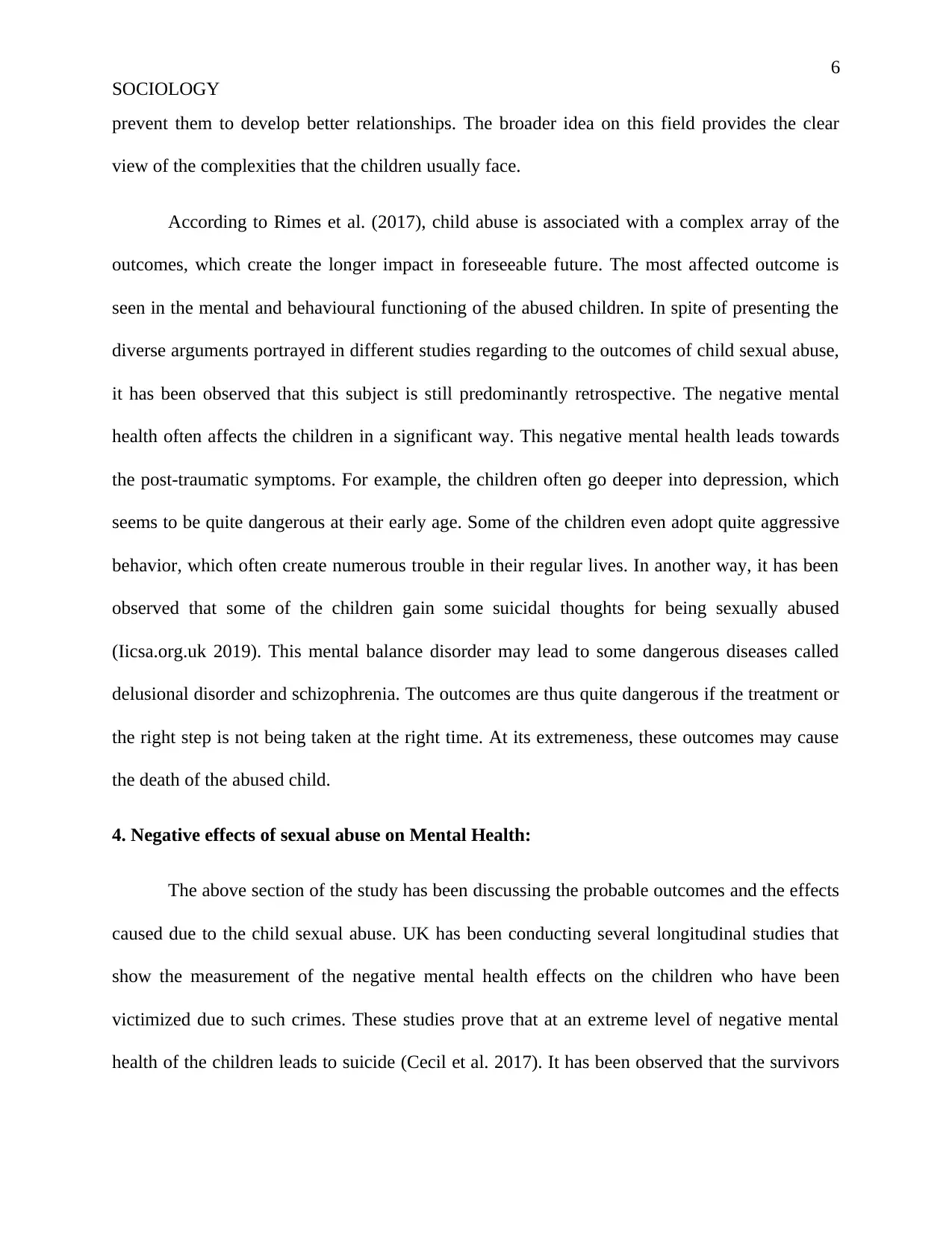
6
SOCIOLOGY
prevent them to develop better relationships. The broader idea on this field provides the clear
view of the complexities that the children usually face.
According to Rimes et al. (2017), child abuse is associated with a complex array of the
outcomes, which create the longer impact in foreseeable future. The most affected outcome is
seen in the mental and behavioural functioning of the abused children. In spite of presenting the
diverse arguments portrayed in different studies regarding to the outcomes of child sexual abuse,
it has been observed that this subject is still predominantly retrospective. The negative mental
health often affects the children in a significant way. This negative mental health leads towards
the post-traumatic symptoms. For example, the children often go deeper into depression, which
seems to be quite dangerous at their early age. Some of the children even adopt quite aggressive
behavior, which often create numerous trouble in their regular lives. In another way, it has been
observed that some of the children gain some suicidal thoughts for being sexually abused
(Iicsa.org.uk 2019). This mental balance disorder may lead to some dangerous diseases called
delusional disorder and schizophrenia. The outcomes are thus quite dangerous if the treatment or
the right step is not being taken at the right time. At its extremeness, these outcomes may cause
the death of the abused child.
4. Negative effects of sexual abuse on Mental Health:
The above section of the study has been discussing the probable outcomes and the effects
caused due to the child sexual abuse. UK has been conducting several longitudinal studies that
show the measurement of the negative mental health effects on the children who have been
victimized due to such crimes. These studies prove that at an extreme level of negative mental
health of the children leads to suicide (Cecil et al. 2017). It has been observed that the survivors
SOCIOLOGY
prevent them to develop better relationships. The broader idea on this field provides the clear
view of the complexities that the children usually face.
According to Rimes et al. (2017), child abuse is associated with a complex array of the
outcomes, which create the longer impact in foreseeable future. The most affected outcome is
seen in the mental and behavioural functioning of the abused children. In spite of presenting the
diverse arguments portrayed in different studies regarding to the outcomes of child sexual abuse,
it has been observed that this subject is still predominantly retrospective. The negative mental
health often affects the children in a significant way. This negative mental health leads towards
the post-traumatic symptoms. For example, the children often go deeper into depression, which
seems to be quite dangerous at their early age. Some of the children even adopt quite aggressive
behavior, which often create numerous trouble in their regular lives. In another way, it has been
observed that some of the children gain some suicidal thoughts for being sexually abused
(Iicsa.org.uk 2019). This mental balance disorder may lead to some dangerous diseases called
delusional disorder and schizophrenia. The outcomes are thus quite dangerous if the treatment or
the right step is not being taken at the right time. At its extremeness, these outcomes may cause
the death of the abused child.
4. Negative effects of sexual abuse on Mental Health:
The above section of the study has been discussing the probable outcomes and the effects
caused due to the child sexual abuse. UK has been conducting several longitudinal studies that
show the measurement of the negative mental health effects on the children who have been
victimized due to such crimes. These studies prove that at an extreme level of negative mental
health of the children leads to suicide (Cecil et al. 2017). It has been observed that the survivors
⊘ This is a preview!⊘
Do you want full access?
Subscribe today to unlock all pages.

Trusted by 1+ million students worldwide
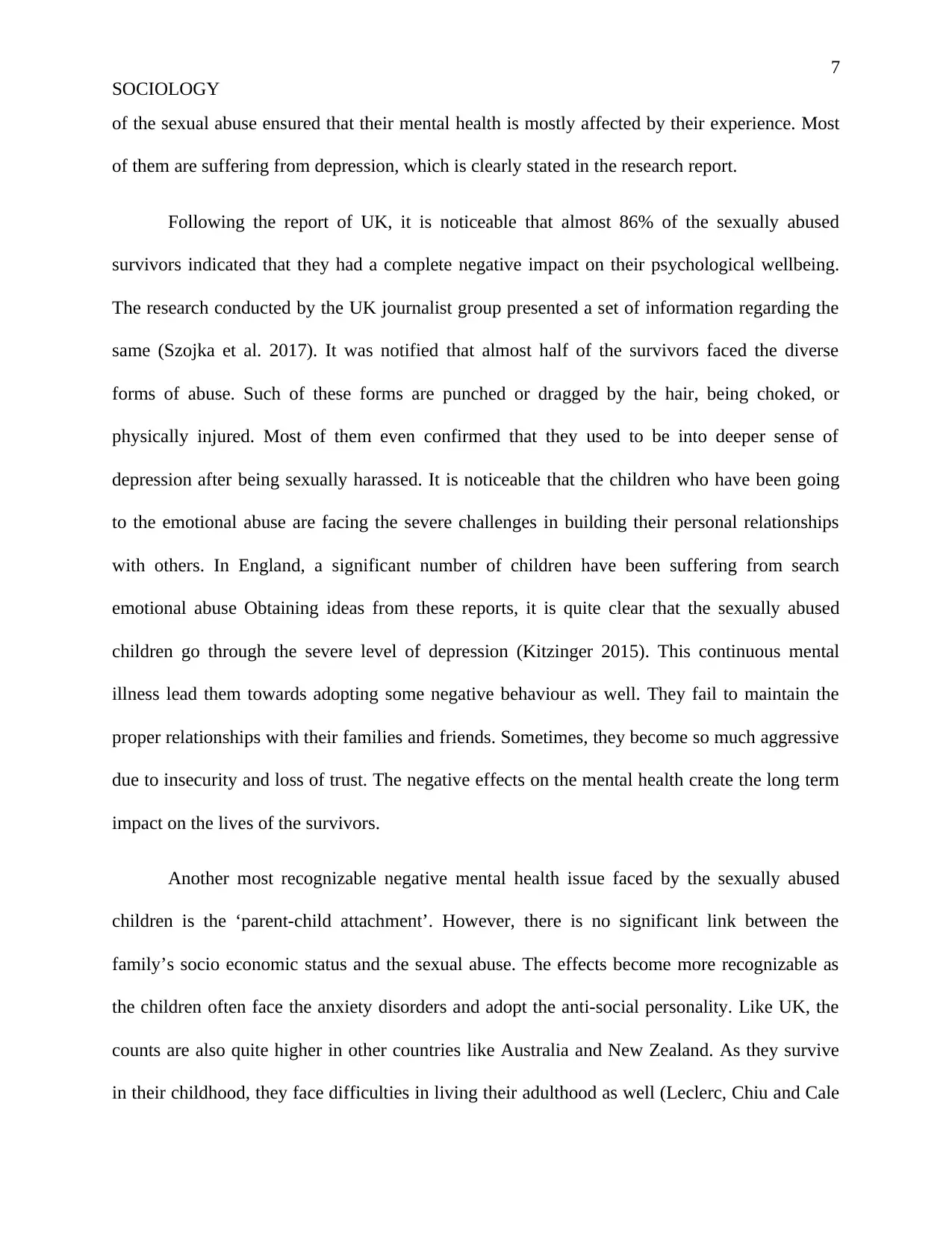
7
SOCIOLOGY
of the sexual abuse ensured that their mental health is mostly affected by their experience. Most
of them are suffering from depression, which is clearly stated in the research report.
Following the report of UK, it is noticeable that almost 86% of the sexually abused
survivors indicated that they had a complete negative impact on their psychological wellbeing.
The research conducted by the UK journalist group presented a set of information regarding the
same (Szojka et al. 2017). It was notified that almost half of the survivors faced the diverse
forms of abuse. Such of these forms are punched or dragged by the hair, being choked, or
physically injured. Most of them even confirmed that they used to be into deeper sense of
depression after being sexually harassed. It is noticeable that the children who have been going
to the emotional abuse are facing the severe challenges in building their personal relationships
with others. In England, a significant number of children have been suffering from search
emotional abuse Obtaining ideas from these reports, it is quite clear that the sexually abused
children go through the severe level of depression (Kitzinger 2015). This continuous mental
illness lead them towards adopting some negative behaviour as well. They fail to maintain the
proper relationships with their families and friends. Sometimes, they become so much aggressive
due to insecurity and loss of trust. The negative effects on the mental health create the long term
impact on the lives of the survivors.
Another most recognizable negative mental health issue faced by the sexually abused
children is the ‘parent-child attachment’. However, there is no significant link between the
family’s socio economic status and the sexual abuse. The effects become more recognizable as
the children often face the anxiety disorders and adopt the anti-social personality. Like UK, the
counts are also quite higher in other countries like Australia and New Zealand. As they survive
in their childhood, they face difficulties in living their adulthood as well (Leclerc, Chiu and Cale
SOCIOLOGY
of the sexual abuse ensured that their mental health is mostly affected by their experience. Most
of them are suffering from depression, which is clearly stated in the research report.
Following the report of UK, it is noticeable that almost 86% of the sexually abused
survivors indicated that they had a complete negative impact on their psychological wellbeing.
The research conducted by the UK journalist group presented a set of information regarding the
same (Szojka et al. 2017). It was notified that almost half of the survivors faced the diverse
forms of abuse. Such of these forms are punched or dragged by the hair, being choked, or
physically injured. Most of them even confirmed that they used to be into deeper sense of
depression after being sexually harassed. It is noticeable that the children who have been going
to the emotional abuse are facing the severe challenges in building their personal relationships
with others. In England, a significant number of children have been suffering from search
emotional abuse Obtaining ideas from these reports, it is quite clear that the sexually abused
children go through the severe level of depression (Kitzinger 2015). This continuous mental
illness lead them towards adopting some negative behaviour as well. They fail to maintain the
proper relationships with their families and friends. Sometimes, they become so much aggressive
due to insecurity and loss of trust. The negative effects on the mental health create the long term
impact on the lives of the survivors.
Another most recognizable negative mental health issue faced by the sexually abused
children is the ‘parent-child attachment’. However, there is no significant link between the
family’s socio economic status and the sexual abuse. The effects become more recognizable as
the children often face the anxiety disorders and adopt the anti-social personality. Like UK, the
counts are also quite higher in other countries like Australia and New Zealand. As they survive
in their childhood, they face difficulties in living their adulthood as well (Leclerc, Chiu and Cale
Paraphrase This Document
Need a fresh take? Get an instant paraphrase of this document with our AI Paraphraser
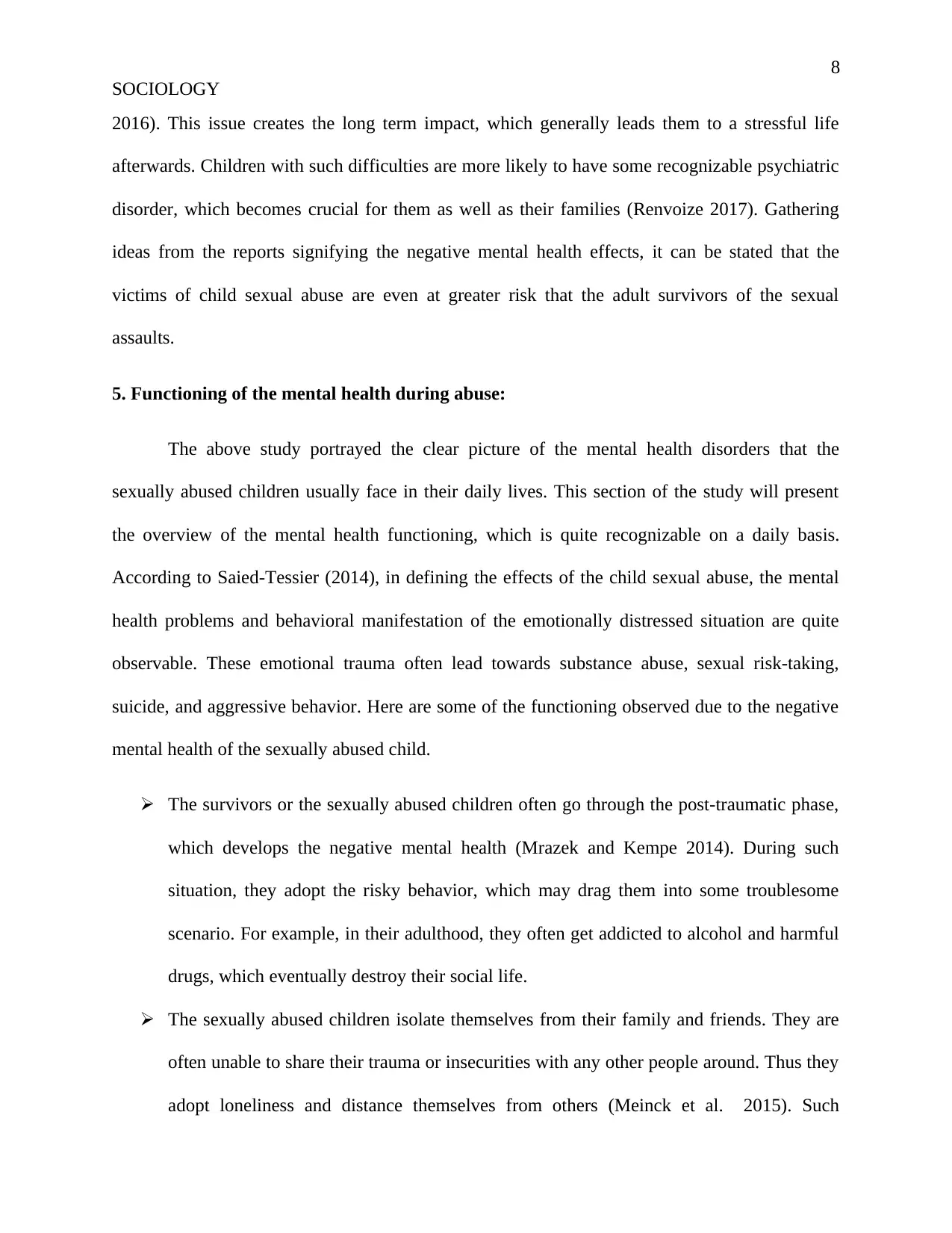
8
SOCIOLOGY
2016). This issue creates the long term impact, which generally leads them to a stressful life
afterwards. Children with such difficulties are more likely to have some recognizable psychiatric
disorder, which becomes crucial for them as well as their families (Renvoize 2017). Gathering
ideas from the reports signifying the negative mental health effects, it can be stated that the
victims of child sexual abuse are even at greater risk that the adult survivors of the sexual
assaults.
5. Functioning of the mental health during abuse:
The above study portrayed the clear picture of the mental health disorders that the
sexually abused children usually face in their daily lives. This section of the study will present
the overview of the mental health functioning, which is quite recognizable on a daily basis.
According to Saied-Tessier (2014), in defining the effects of the child sexual abuse, the mental
health problems and behavioral manifestation of the emotionally distressed situation are quite
observable. These emotional trauma often lead towards substance abuse, sexual risk-taking,
suicide, and aggressive behavior. Here are some of the functioning observed due to the negative
mental health of the sexually abused child.
The survivors or the sexually abused children often go through the post-traumatic phase,
which develops the negative mental health (Mrazek and Kempe 2014). During such
situation, they adopt the risky behavior, which may drag them into some troublesome
scenario. For example, in their adulthood, they often get addicted to alcohol and harmful
drugs, which eventually destroy their social life.
The sexually abused children isolate themselves from their family and friends. They are
often unable to share their trauma or insecurities with any other people around. Thus they
adopt loneliness and distance themselves from others (Meinck et al. 2015). Such
SOCIOLOGY
2016). This issue creates the long term impact, which generally leads them to a stressful life
afterwards. Children with such difficulties are more likely to have some recognizable psychiatric
disorder, which becomes crucial for them as well as their families (Renvoize 2017). Gathering
ideas from the reports signifying the negative mental health effects, it can be stated that the
victims of child sexual abuse are even at greater risk that the adult survivors of the sexual
assaults.
5. Functioning of the mental health during abuse:
The above study portrayed the clear picture of the mental health disorders that the
sexually abused children usually face in their daily lives. This section of the study will present
the overview of the mental health functioning, which is quite recognizable on a daily basis.
According to Saied-Tessier (2014), in defining the effects of the child sexual abuse, the mental
health problems and behavioral manifestation of the emotionally distressed situation are quite
observable. These emotional trauma often lead towards substance abuse, sexual risk-taking,
suicide, and aggressive behavior. Here are some of the functioning observed due to the negative
mental health of the sexually abused child.
The survivors or the sexually abused children often go through the post-traumatic phase,
which develops the negative mental health (Mrazek and Kempe 2014). During such
situation, they adopt the risky behavior, which may drag them into some troublesome
scenario. For example, in their adulthood, they often get addicted to alcohol and harmful
drugs, which eventually destroy their social life.
The sexually abused children isolate themselves from their family and friends. They are
often unable to share their trauma or insecurities with any other people around. Thus they
adopt loneliness and distance themselves from others (Meinck et al. 2015). Such
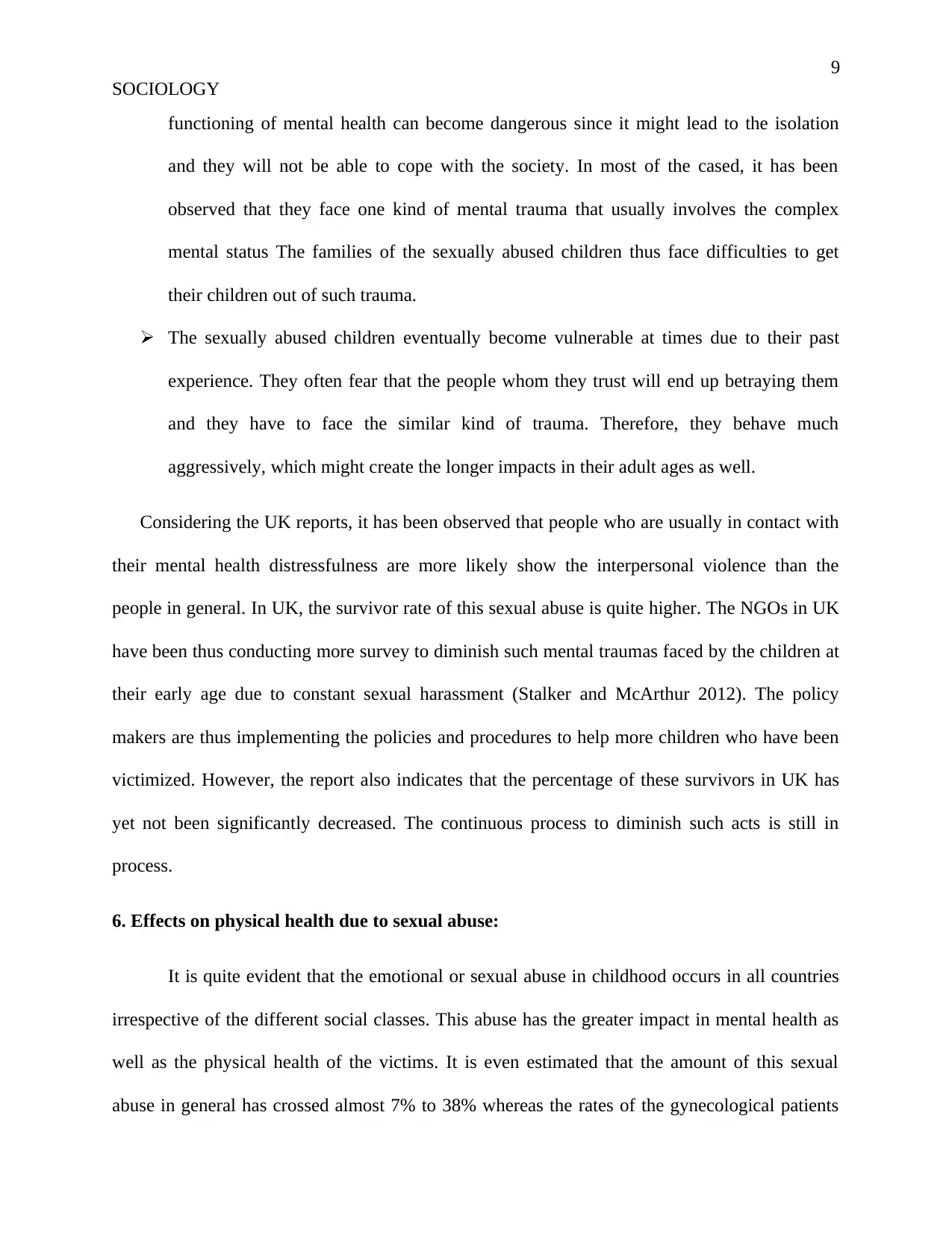
9
SOCIOLOGY
functioning of mental health can become dangerous since it might lead to the isolation
and they will not be able to cope with the society. In most of the cased, it has been
observed that they face one kind of mental trauma that usually involves the complex
mental status The families of the sexually abused children thus face difficulties to get
their children out of such trauma.
The sexually abused children eventually become vulnerable at times due to their past
experience. They often fear that the people whom they trust will end up betraying them
and they have to face the similar kind of trauma. Therefore, they behave much
aggressively, which might create the longer impacts in their adult ages as well.
Considering the UK reports, it has been observed that people who are usually in contact with
their mental health distressfulness are more likely show the interpersonal violence than the
people in general. In UK, the survivor rate of this sexual abuse is quite higher. The NGOs in UK
have been thus conducting more survey to diminish such mental traumas faced by the children at
their early age due to constant sexual harassment (Stalker and McArthur 2012). The policy
makers are thus implementing the policies and procedures to help more children who have been
victimized. However, the report also indicates that the percentage of these survivors in UK has
yet not been significantly decreased. The continuous process to diminish such acts is still in
process.
6. Effects on physical health due to sexual abuse:
It is quite evident that the emotional or sexual abuse in childhood occurs in all countries
irrespective of the different social classes. This abuse has the greater impact in mental health as
well as the physical health of the victims. It is even estimated that the amount of this sexual
abuse in general has crossed almost 7% to 38% whereas the rates of the gynecological patients
SOCIOLOGY
functioning of mental health can become dangerous since it might lead to the isolation
and they will not be able to cope with the society. In most of the cased, it has been
observed that they face one kind of mental trauma that usually involves the complex
mental status The families of the sexually abused children thus face difficulties to get
their children out of such trauma.
The sexually abused children eventually become vulnerable at times due to their past
experience. They often fear that the people whom they trust will end up betraying them
and they have to face the similar kind of trauma. Therefore, they behave much
aggressively, which might create the longer impacts in their adult ages as well.
Considering the UK reports, it has been observed that people who are usually in contact with
their mental health distressfulness are more likely show the interpersonal violence than the
people in general. In UK, the survivor rate of this sexual abuse is quite higher. The NGOs in UK
have been thus conducting more survey to diminish such mental traumas faced by the children at
their early age due to constant sexual harassment (Stalker and McArthur 2012). The policy
makers are thus implementing the policies and procedures to help more children who have been
victimized. However, the report also indicates that the percentage of these survivors in UK has
yet not been significantly decreased. The continuous process to diminish such acts is still in
process.
6. Effects on physical health due to sexual abuse:
It is quite evident that the emotional or sexual abuse in childhood occurs in all countries
irrespective of the different social classes. This abuse has the greater impact in mental health as
well as the physical health of the victims. It is even estimated that the amount of this sexual
abuse in general has crossed almost 7% to 38% whereas the rates of the gynecological patients
⊘ This is a preview!⊘
Do you want full access?
Subscribe today to unlock all pages.

Trusted by 1+ million students worldwide
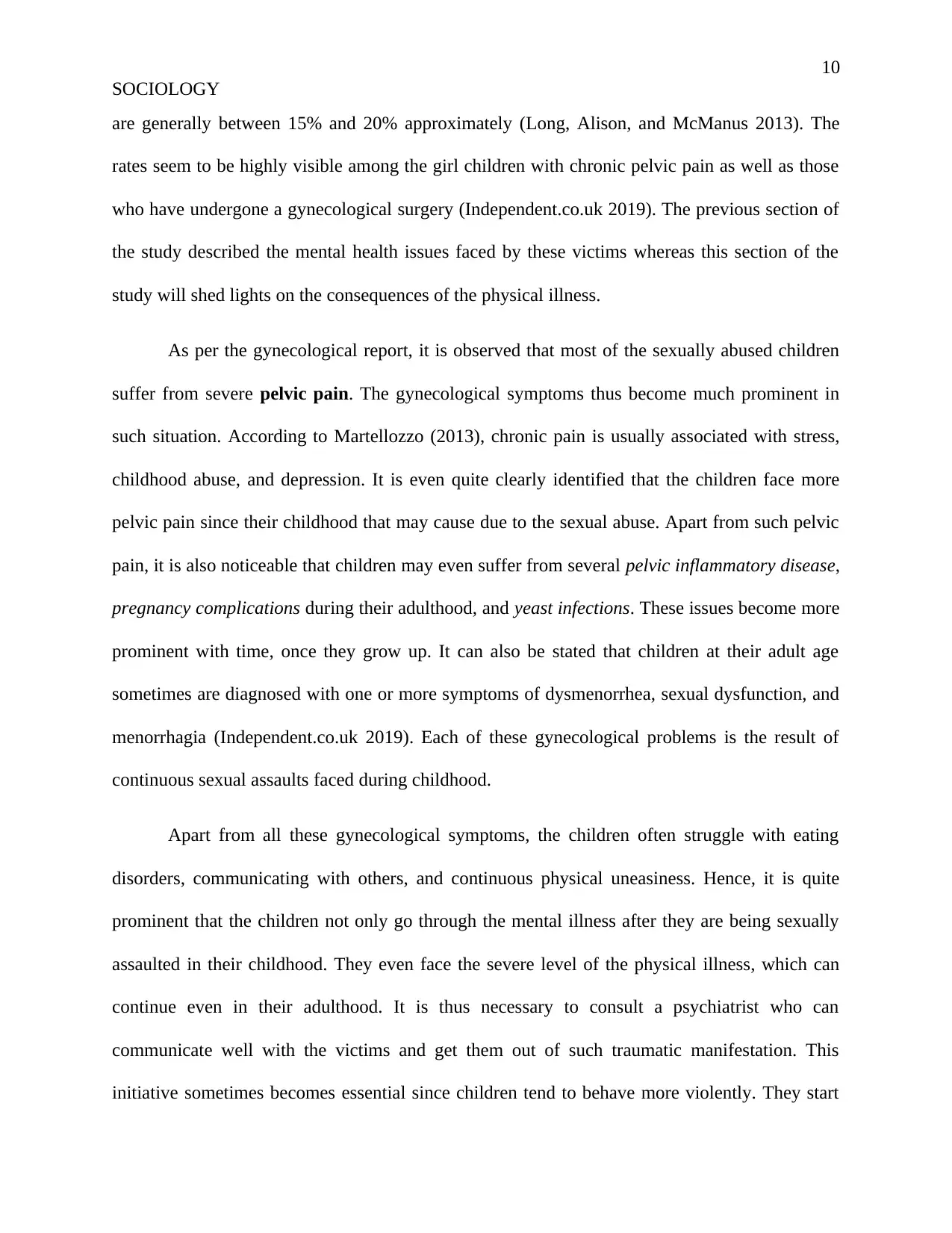
10
SOCIOLOGY
are generally between 15% and 20% approximately (Long, Alison, and McManus 2013). The
rates seem to be highly visible among the girl children with chronic pelvic pain as well as those
who have undergone a gynecological surgery (Independent.co.uk 2019). The previous section of
the study described the mental health issues faced by these victims whereas this section of the
study will shed lights on the consequences of the physical illness.
As per the gynecological report, it is observed that most of the sexually abused children
suffer from severe pelvic pain. The gynecological symptoms thus become much prominent in
such situation. According to Martellozzo (2013), chronic pain is usually associated with stress,
childhood abuse, and depression. It is even quite clearly identified that the children face more
pelvic pain since their childhood that may cause due to the sexual abuse. Apart from such pelvic
pain, it is also noticeable that children may even suffer from several pelvic inflammatory disease,
pregnancy complications during their adulthood, and yeast infections. These issues become more
prominent with time, once they grow up. It can also be stated that children at their adult age
sometimes are diagnosed with one or more symptoms of dysmenorrhea, sexual dysfunction, and
menorrhagia (Independent.co.uk 2019). Each of these gynecological problems is the result of
continuous sexual assaults faced during childhood.
Apart from all these gynecological symptoms, the children often struggle with eating
disorders, communicating with others, and continuous physical uneasiness. Hence, it is quite
prominent that the children not only go through the mental illness after they are being sexually
assaulted in their childhood. They even face the severe level of the physical illness, which can
continue even in their adulthood. It is thus necessary to consult a psychiatrist who can
communicate well with the victims and get them out of such traumatic manifestation. This
initiative sometimes becomes essential since children tend to behave more violently. They start
SOCIOLOGY
are generally between 15% and 20% approximately (Long, Alison, and McManus 2013). The
rates seem to be highly visible among the girl children with chronic pelvic pain as well as those
who have undergone a gynecological surgery (Independent.co.uk 2019). The previous section of
the study described the mental health issues faced by these victims whereas this section of the
study will shed lights on the consequences of the physical illness.
As per the gynecological report, it is observed that most of the sexually abused children
suffer from severe pelvic pain. The gynecological symptoms thus become much prominent in
such situation. According to Martellozzo (2013), chronic pain is usually associated with stress,
childhood abuse, and depression. It is even quite clearly identified that the children face more
pelvic pain since their childhood that may cause due to the sexual abuse. Apart from such pelvic
pain, it is also noticeable that children may even suffer from several pelvic inflammatory disease,
pregnancy complications during their adulthood, and yeast infections. These issues become more
prominent with time, once they grow up. It can also be stated that children at their adult age
sometimes are diagnosed with one or more symptoms of dysmenorrhea, sexual dysfunction, and
menorrhagia (Independent.co.uk 2019). Each of these gynecological problems is the result of
continuous sexual assaults faced during childhood.
Apart from all these gynecological symptoms, the children often struggle with eating
disorders, communicating with others, and continuous physical uneasiness. Hence, it is quite
prominent that the children not only go through the mental illness after they are being sexually
assaulted in their childhood. They even face the severe level of the physical illness, which can
continue even in their adulthood. It is thus necessary to consult a psychiatrist who can
communicate well with the victims and get them out of such traumatic manifestation. This
initiative sometimes becomes essential since children tend to behave more violently. They start
Paraphrase This Document
Need a fresh take? Get an instant paraphrase of this document with our AI Paraphraser
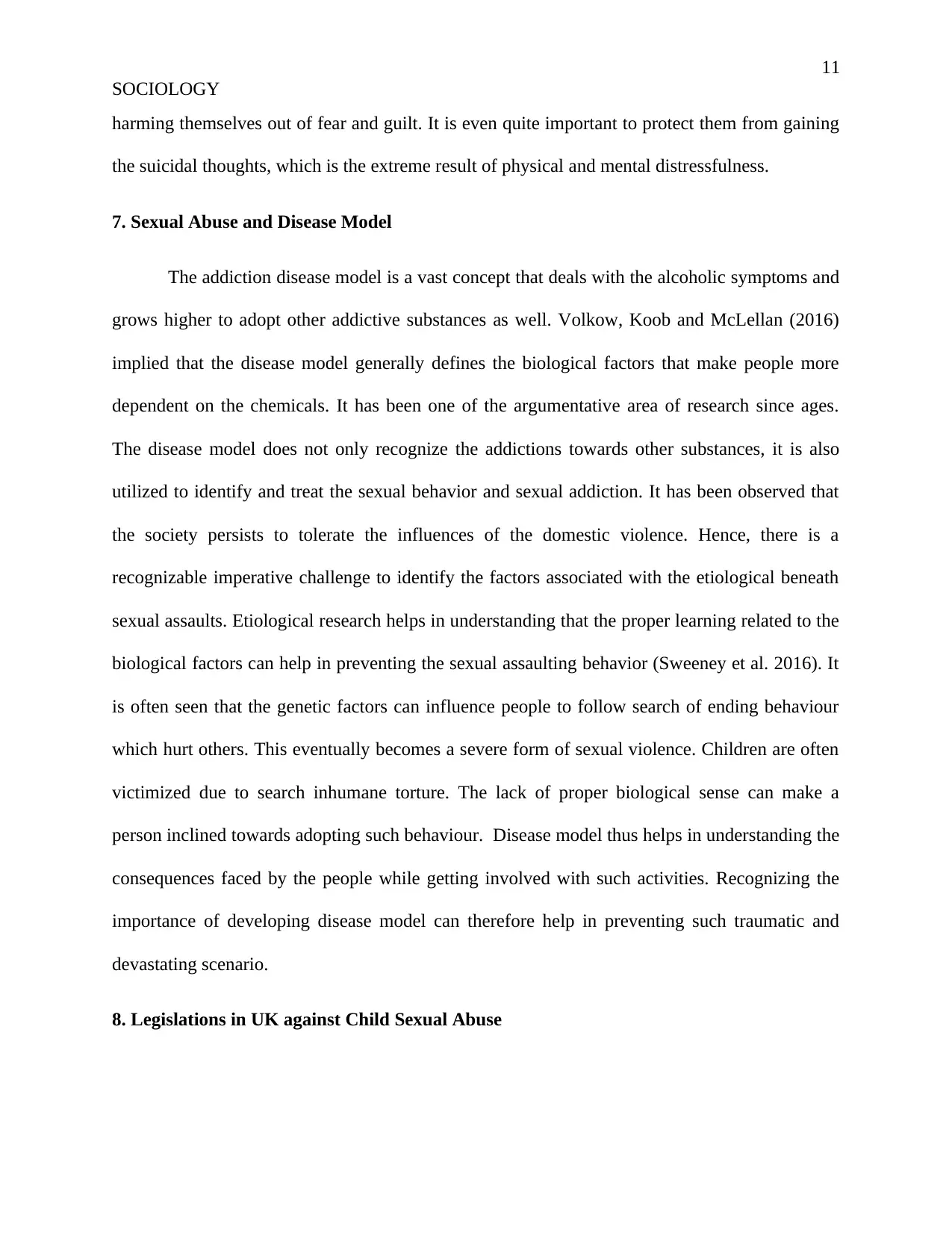
11
SOCIOLOGY
harming themselves out of fear and guilt. It is even quite important to protect them from gaining
the suicidal thoughts, which is the extreme result of physical and mental distressfulness.
7. Sexual Abuse and Disease Model
The addiction disease model is a vast concept that deals with the alcoholic symptoms and
grows higher to adopt other addictive substances as well. Volkow, Koob and McLellan (2016)
implied that the disease model generally defines the biological factors that make people more
dependent on the chemicals. It has been one of the argumentative area of research since ages.
The disease model does not only recognize the addictions towards other substances, it is also
utilized to identify and treat the sexual behavior and sexual addiction. It has been observed that
the society persists to tolerate the influences of the domestic violence. Hence, there is a
recognizable imperative challenge to identify the factors associated with the etiological beneath
sexual assaults. Etiological research helps in understanding that the proper learning related to the
biological factors can help in preventing the sexual assaulting behavior (Sweeney et al. 2016). It
is often seen that the genetic factors can influence people to follow search of ending behaviour
which hurt others. This eventually becomes a severe form of sexual violence. Children are often
victimized due to search inhumane torture. The lack of proper biological sense can make a
person inclined towards adopting such behaviour. Disease model thus helps in understanding the
consequences faced by the people while getting involved with such activities. Recognizing the
importance of developing disease model can therefore help in preventing such traumatic and
devastating scenario.
8. Legislations in UK against Child Sexual Abuse
SOCIOLOGY
harming themselves out of fear and guilt. It is even quite important to protect them from gaining
the suicidal thoughts, which is the extreme result of physical and mental distressfulness.
7. Sexual Abuse and Disease Model
The addiction disease model is a vast concept that deals with the alcoholic symptoms and
grows higher to adopt other addictive substances as well. Volkow, Koob and McLellan (2016)
implied that the disease model generally defines the biological factors that make people more
dependent on the chemicals. It has been one of the argumentative area of research since ages.
The disease model does not only recognize the addictions towards other substances, it is also
utilized to identify and treat the sexual behavior and sexual addiction. It has been observed that
the society persists to tolerate the influences of the domestic violence. Hence, there is a
recognizable imperative challenge to identify the factors associated with the etiological beneath
sexual assaults. Etiological research helps in understanding that the proper learning related to the
biological factors can help in preventing the sexual assaulting behavior (Sweeney et al. 2016). It
is often seen that the genetic factors can influence people to follow search of ending behaviour
which hurt others. This eventually becomes a severe form of sexual violence. Children are often
victimized due to search inhumane torture. The lack of proper biological sense can make a
person inclined towards adopting such behaviour. Disease model thus helps in understanding the
consequences faced by the people while getting involved with such activities. Recognizing the
importance of developing disease model can therefore help in preventing such traumatic and
devastating scenario.
8. Legislations in UK against Child Sexual Abuse
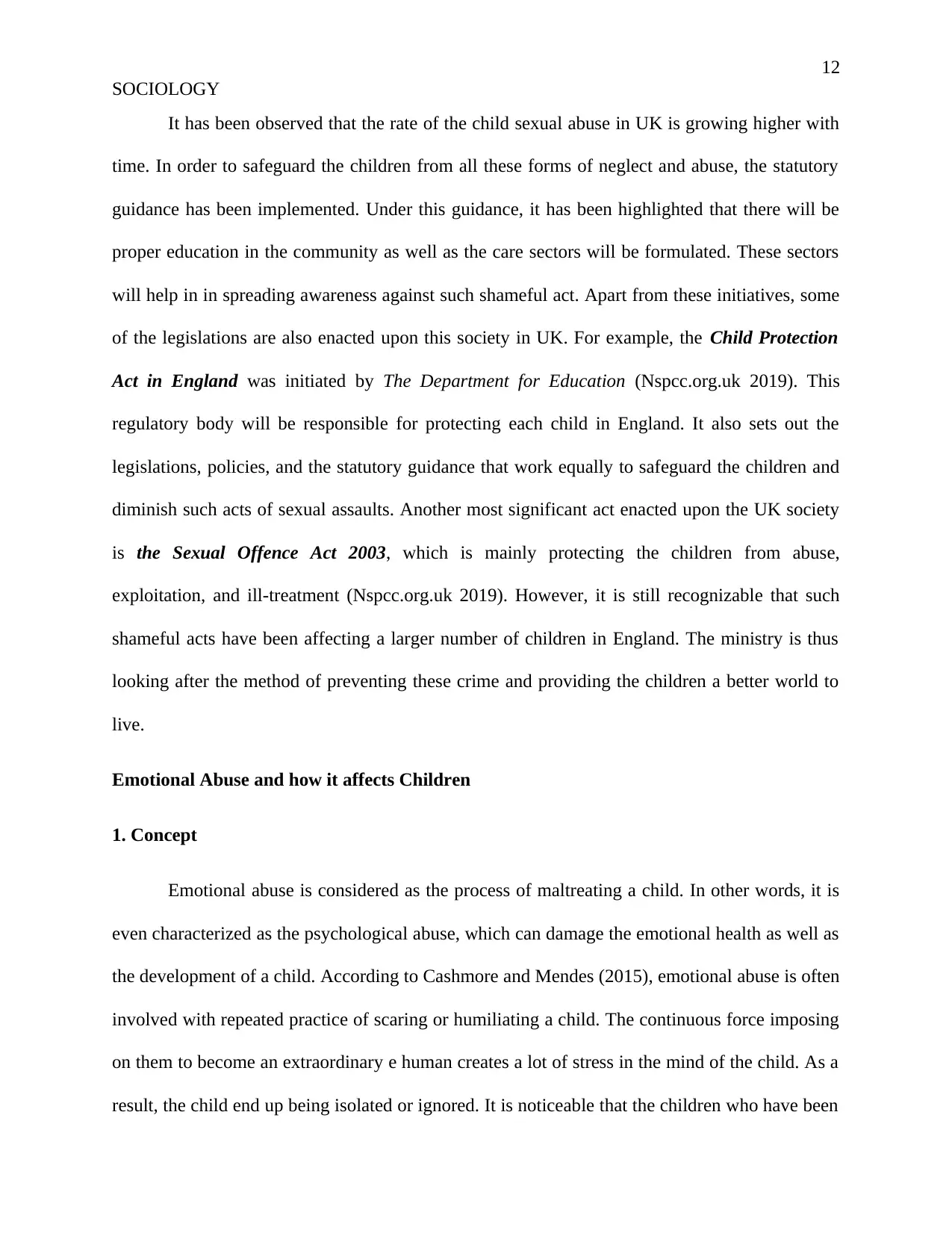
12
SOCIOLOGY
It has been observed that the rate of the child sexual abuse in UK is growing higher with
time. In order to safeguard the children from all these forms of neglect and abuse, the statutory
guidance has been implemented. Under this guidance, it has been highlighted that there will be
proper education in the community as well as the care sectors will be formulated. These sectors
will help in in spreading awareness against such shameful act. Apart from these initiatives, some
of the legislations are also enacted upon this society in UK. For example, the Child Protection
Act in England was initiated by The Department for Education (Nspcc.org.uk 2019). This
regulatory body will be responsible for protecting each child in England. It also sets out the
legislations, policies, and the statutory guidance that work equally to safeguard the children and
diminish such acts of sexual assaults. Another most significant act enacted upon the UK society
is the Sexual Offence Act 2003, which is mainly protecting the children from abuse,
exploitation, and ill-treatment (Nspcc.org.uk 2019). However, it is still recognizable that such
shameful acts have been affecting a larger number of children in England. The ministry is thus
looking after the method of preventing these crime and providing the children a better world to
live.
Emotional Abuse and how it affects Children
1. Concept
Emotional abuse is considered as the process of maltreating a child. In other words, it is
even characterized as the psychological abuse, which can damage the emotional health as well as
the development of a child. According to Cashmore and Mendes (2015), emotional abuse is often
involved with repeated practice of scaring or humiliating a child. The continuous force imposing
on them to become an extraordinary e human creates a lot of stress in the mind of the child. As a
result, the child end up being isolated or ignored. It is noticeable that the children who have been
SOCIOLOGY
It has been observed that the rate of the child sexual abuse in UK is growing higher with
time. In order to safeguard the children from all these forms of neglect and abuse, the statutory
guidance has been implemented. Under this guidance, it has been highlighted that there will be
proper education in the community as well as the care sectors will be formulated. These sectors
will help in in spreading awareness against such shameful act. Apart from these initiatives, some
of the legislations are also enacted upon this society in UK. For example, the Child Protection
Act in England was initiated by The Department for Education (Nspcc.org.uk 2019). This
regulatory body will be responsible for protecting each child in England. It also sets out the
legislations, policies, and the statutory guidance that work equally to safeguard the children and
diminish such acts of sexual assaults. Another most significant act enacted upon the UK society
is the Sexual Offence Act 2003, which is mainly protecting the children from abuse,
exploitation, and ill-treatment (Nspcc.org.uk 2019). However, it is still recognizable that such
shameful acts have been affecting a larger number of children in England. The ministry is thus
looking after the method of preventing these crime and providing the children a better world to
live.
Emotional Abuse and how it affects Children
1. Concept
Emotional abuse is considered as the process of maltreating a child. In other words, it is
even characterized as the psychological abuse, which can damage the emotional health as well as
the development of a child. According to Cashmore and Mendes (2015), emotional abuse is often
involved with repeated practice of scaring or humiliating a child. The continuous force imposing
on them to become an extraordinary e human creates a lot of stress in the mind of the child. As a
result, the child end up being isolated or ignored. It is noticeable that the children who have been
⊘ This is a preview!⊘
Do you want full access?
Subscribe today to unlock all pages.

Trusted by 1+ million students worldwide
1 out of 31
Related Documents
Your All-in-One AI-Powered Toolkit for Academic Success.
+13062052269
info@desklib.com
Available 24*7 on WhatsApp / Email
![[object Object]](/_next/static/media/star-bottom.7253800d.svg)
Unlock your academic potential
Copyright © 2020–2026 A2Z Services. All Rights Reserved. Developed and managed by ZUCOL.





